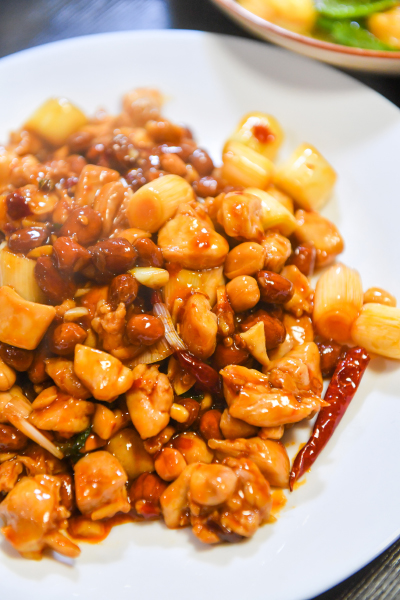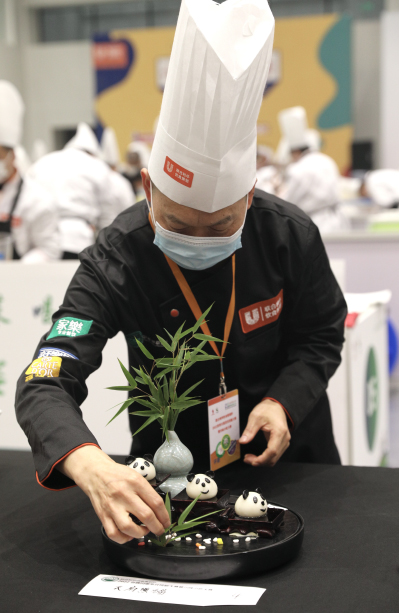| Lifestyle |
| Taming Sichuan's heat for health-conscious consumers | |
|
|
 Kung Pao Chicken, a popular Sichuan dish (WEI YAO)
Though shot in different years and set in different locations, hit U.S. television series such as The Big Bang Theory, Friends and Ugly Betty have one thing in common: Some of their main characters frequently ordered food from Sichuan restaurants, with Sheldon Cooper, the socially awkward theoretical physicist in The Big Bang Theory, famously "freaking out" when his favorite Chinese restaurant Sichuan Palace moved. Credible? Yes. Actually, Sichuan cuisine is one of the hottest Chinese cuisines in the world—in both flavor and popularity. Another testament to the popularity of Sichuan cuisine is the mushrooming of Panda Express, an international fast food corporation that offers typical dishes with origins in the southwestern Chinese province of Sichuan, including the orange chicken, tangerine chicken, black pepper chicken and Kung Pao chicken. Panda Express operates more than 2,500 restaurants around the world, spreading across the United States, Canada, Mexico, Russia, the Republic of Korea, Japan and the Philippines. Zhao Xinyi, a 21-year-old Chinese student in New York City, said Sichuan cuisine is popular among her classmates. "When we finished a class project this semester, my teammates suggested we go to Flushing to celebrate, and started listing out Sichuan restaurants," Zhao told Beijing Review. "They told me they often eat Sichuan cuisine." Flushing has the largest Chinese population in New York City. Zhao added that apart from the Michelin restaurant Café China that serves Sichuan dishes, and the aforementioned fast food chain Panda Express, small unbranded Sichuan restaurants in Flushing are also well received by her peers. Huatai Securities, a leading integrated securities group in China, wrote in its report that by 2018, China's food retail platform Meituan had onboarded 100,691 Chinese restaurants from 174 countries and regions outside of China, of which Sichuan restaurants accounted for 21 percent, only next to those serving hotpot (34 percent), also believed to have originated from the area comprising today's Sichuan and Chongqing Municipality, and Chinese fast food brands(29 percent).  A chef garnishes panda-shaped dim sum at the Fifth World Sichuan Cuisine Conference in Yaan, Sichuan Province, on November 3, 2022 (XINHUA)
Shaking off the shackles With Sichuan cuisine becoming increasingly popular at home and abroad, challenges arise along with opportunities, and one of the biggest is the stereotype that it is unhealthy, as many of Sichuan's best known and most loved dishes are heavy in oil, salt and hot peppers, and are therefore considered unhealthy by many. "I grew up eating these dishes, but when I started cooking them on my own a few years ago, I realized how much oil and salt are used in them," Zhou Xiaotong, a Sichuan cuisine lover from Mianyang, Sichuan, told Beijing Review. "I still love them, but now I have some concerns for my health and figure." Zhou added that she eats these dishes only once a week as a special treat for herself, and has light meals at other times. Additionally, when consuming Sichuan dishes that contain large amounts of chili oil, Zhou now uses her chopsticks to rinse each mouthful in a bowl of water before eating. Like Zhou, many young customers are putting health before taste. In recent years, the light meal industry has experienced rapid development in China. According to data from Qichacha, a platform for searching information on enterprises, the number of registered light meal brands in China was 236 in 2015, but it had reached 3,522 by 2020. In order to shake off the stereotype and make Sichuan cuisine known for being as healthy as it is delicious, entrepreneurs and chefs are making adjustments to recipes and cooking methods. Lan Minglu, a seasoned chef of Sichuan cuisine who was featured in A Bite of China III, a 2018 documentary on Chinese food produced by state broadcaster CCTV, rejects the argument that heavy oil and hot peppers are the primary reasons why people love Sichuan food. "The attraction of Sichuan cuisine lies in its wide range of ingredients and the variety of flavors and seasonings," Lan said. "People think of Sichuan cuisine as big plates and bowls full of red oil, and as characterized by rough and bold flavors, but the genre is so much more than that. It can also be healthy, delicate and classy." He added that when cooking Sichuan cuisine, chefs should choose suitable methods based on the different ingredients and materials used, and also continuously adjust their formulas, such as reducing the consumption of oil, to keep up with the ever-changing preferences of diners. Lan translates his ideas into innovative dishes, with juicy beef being a case in point. Traditionally, beef dishes of Sichuan cuisine are oil-heavy. In creating juicy beef, instead of frying the beef, Lan braises it in a low-fat sauce made of traditional seasonings and therefore avoids using too much oil. This new dish has been highly praised by experts from the World Association of Chinese Cuisine. Wang Gang, head of Meizhou Dongpo restaurant group, a famous Sichuan cuisine brand in China, underscores learning from other cultures to promote the cooking methods of Sichuan cuisine. "We need to update Sichuan cuisine from the aspects of healthiness and technique to make it more international," Wang said. "Sichuan food should leverage strengths from other cuisines of China, and ingest the gist of cuisines from France, the United Kingdom and the United States as well." "I would love to eat Sichuan cuisine for all three meals every day—as long as it's half as healthy as light meals," Zhou said, explaining that dipping each mouthful of the dishes in water washes off most of their flavor and oil, "but it still tastes so good." More opportunities The use of ingredients originating in Sichuan is essential to the unique flavor profile of Sichuan cuisine, according to industry insiders. As a result, how to extend the related industrial chain to reach international markets drew widespread attention at the Sixth World Sichuan Cuisine Conference. The event took place in Guang'an, Sichuan, on November 16-17. During the conference, 26 projects were initiated, involving fields such as organic food growing, food production and processing, condiment production, hotpot processing, cold chain warehousing, as well as the integration of agriculture, culture and tourism, cross-border e-commerce, and hotels and homestays, with a total investment of 10.65 billion yuan ($1.49 billion). Meizhou Dongpo now operates five restaurants in Los Angeles, the United Sates. The company has been working to promote the industry chain of Sichuan cuisine to ensure the supply of overseas restaurants. In 2020, it planned to establish an industrial park within five years with an investment of 103 billion yuan ($14.38 billion), covering an area of more than 327 hectares and incorporating fields such as crop growing, food processing, the development of Sichuan cuisine cultural products, and education and training. "It is expected to become the world's largest and most diverse base covering the entire industry chain for Sichuan cuisine," Mu Xinhai, then Secretary of the Communist Party of China Meishan Committee, announced at the initiating ceremony. Meishan, formerly known as Meizhou, is the birthplace of the Meizhou Dongpo brand. Meizhou Dongpo is one of the largest purchasers of agricultural products in Sichuan. In 2022, it purchased raw and value-added agricultural products, including Chinese red peppers, Sichuan peppercorns, black bean sauce, bean sprouts, and Chinese pickled vegetables, worth over 1 billion yuan ($140 million), from 21 cities across the province. "Sichuan cuisine connects consumers from all over the world, and we are going to make the world love our food," Wang said in a promotional video for the conference. Copyedited by G.P. Wilson Comments to zhangyage@cicgamericas.com |
|
||
|
||||||||||||||||||||||||||||
|
